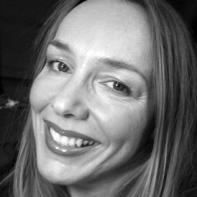Luisa Villani

Luisa Villani is the recipient of a Pennsylvania Council on the Arts Fellowship in poetry, an AWP Intro Journals Award, and an Academy of American Poets Prize. Her work has appeared in The New England Review, The Literary Review, Prairie Schooner, Hayden's Ferry Review and other literary journals. Her book, Running Away from Russia, was chosen for the Bordighera Prize by W.S. Di Piero, and selections from her forthcoming book, Highway of the Mayan Sky, recently appeared in the Random House anthology Poetry 180. She currently is a University Diversity Fellow at the University of Southern California.
The Panacea
Independent of Western Culture, the Maya developed the zero
as number and concept. Emptiness is a way of saving space,
of not losing your place in god's grand design. I imagine
pyramid glyphs flocked by moss, deep in the rainforest,
ancient Mayan priests with cartoon balloons over their heads,
empty as a burp.
And surely, to people fluent in the language of nothing,
the following will come as no surprise:
a donated computer arrived at a certain bureau de derechos
humanos, a little passed its prime, grimy keyboard with
gunpowder-like ghosts pressed across its symbols,
and was promptly put into an unused room
which as it turns out, was not really unused,
just empty, the way a nest remains empty all winter
waiting for its eggs. Anselmo knew this place
as “the room of closed eyes” just as every inhabitant
of the rainforest knew there was a place in the jostling city
for those without a place. Against the gloaming sky
the black weathered doors opened many times, like the cover
of a favorite book. Let's say this book was a secret though,
just to protect the who and when, from the khaki shirts
quizzing patrons at the five-and-ten. Knowing
as little as possible is less of a liability,
than knowing nothing at all. Knowing nothing at all
might indicate you really know something, in the way
all things implicate their opposites, and that innocent
shoulder shrug could earn you a mouthful
of rifle butt. But of course, we all know that never really happens,
just as the empty skull you found in the forest
was not a victim post-demise, but surely a relic
rolled down from a yet undiscovered pyramid, and you should know better
than to put artifacts in zip-lock bags as if you were taking
them home, when they have a home already in the museo
nacional. At a time like that agreeing with the paucity
of plausibility and handing over what little you know
can save your life, and nothing can kill you,
as surely as the clean hole above the auricular fissure
removed all speculations on mortality
from the now vacant skull. Faced with an emptiness of that fashion
it's easy to find your place in life's candent fictions,
just as it was easy for Anselmo to decipher zeroes and ones
into a language older than electricity. He sat before the glowing screen
with six of his friends, and explained some of his ancient astronomy to me
and why computer language made sense; it was based on what was
and wasn't there. That was when I knew
intelligence lived in the bones
and repeated itself, the way saplings repeated the elder
they someday would outgrow. He explained the “you” you were
(you), and the “you” you were not (your shadow), and how
these two met exactly twice per year, when the sun
shone directly overhead. I called it a cycle, but he corrected me
holding out a fresh tortilla, folding it, then
letting it spring open. “No dividing time. Only people.”
He handed me a green bottle of soda-his cure for every
ailment-and encouraged me to belch, to release
the internal “evil spirit.” If I could have released the “I”
I was not at that moment, it would have boomed
like the explosion of something huge stuffed in a narrow barrel
suddenly released at true velocity. I shoved a tortilla
in my mouth instead. I held that crust in my shaky hand:
the little I understood time, the much I understood of fiction,
how the nothingness that was, and wasn't,
were as simple as two sides of the same tortilla
and as dumb as hunger.

